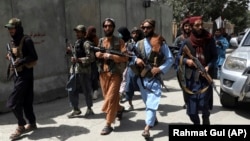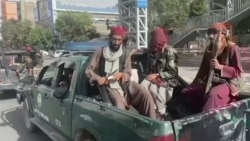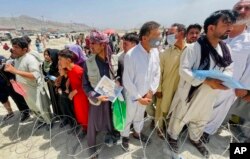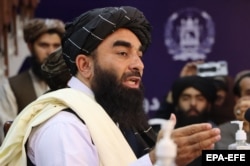Current Time TV’s freelance correspondent in Kabul, Liza Karimi, reports having been threatened on August 17 by unknown males by both phone and in writing. These communications followed statements by Taliban spokesman Zabihullah Mujahid that women would be allowed to work and a free media to function within the bounds of Islamic law.
The individuals who contacted Karimi shortly before she went on air by phone with Current Time’s August 17 Evening newscast, stated that “We just wish that the Taliban will capture you quickly,” the journalist said. “And why, for what [reason], they didn’t want to tell me this.”
Karimi, a Russian and English-speaking Kabul native, believes that the individuals who contacted her may have been sympathizers with the Taliban, the ultraconservative Islamist movement that has held de facto power in Afghanistan since defeating government forces at Kabul on August 15 and prompting the flight of President Ashraf Ghani. She said that she did not know whether these individuals intended to threaten her or simply to scare her.
“It’s difficult to say now how real these threats are because there are people who make use of moments like this,” Karimi told Current Time’s August 18 Morning news show from Kabul. “And those people who formerly knew me as a journalist, perhaps it’s even them, those who have gone over to the Taliban’s side. They can do the same thing – scare me or something like that.”
Frightened, Karimi said she did not call back the number to learn the identity of the caller who urged her detention by the Taliban.
No option exists to notify the police since, she noted on Current Time's August 17 Evening newscast, “We have no police.” The consequences of calling a Taliban-run government office to inform them of the threat are unclear and risky, she indicated.
To protect herself, Karimi has changed her place of residence. Individuals familiar with her past work as a journalist and who have opted to support the Taliban “know my house, know where I live, and know my whole family,” she said.
The man who contacted Karimi by writing, she added, “formerly knew me.”
Karimi has no immediate option to leave the country and escape Afghanistan’s Taliban-era chaos. The scene at the Kabul airport, which she witnessed on August 18, remains unchanged from the reported chaos of former days: hordes of people attempting to access the civilian part of the facility.
“No one lets them inside. But as soon as the door [to the airport grounds] opened today, a crowd of people ran toward the airport,” Karimi said. “I don’t know how they then control them. They began to use weapons.”
Gunfire could be heard in the airport’s vicinity on the evening of August 17 until past midnight, she added. Relatives who live elsewhere in Kabul also report regularly hearing gunfire, she said.
Few Taliban, however, could be seen near the airport entrance. Rather, “foreigners” appear to be controlling the grounds around the airport. The U.S. has taken over command of the military section of the airport, and is overseeing air traffic control.
Near the airport’s entrance, women can be seen in greater number than elsewhere on Kabul’s streets, where women either do not appear at all or are accompanied by men, Karimi continued. Those escorted women appear to have “urgent matters” that they need to complete and then return home, she added.
Unconfirmed reports of Taliban assaulting women and children attempting to enter the Kabul airport and, in other parts of Afghanistan, killing women whom they believe have defied them have persisted since the Islamist group’s takeover of the country.
Whether the individuals who contacted Karimi did so because she is a journalist or a woman is unclear, however.
“[Y]ou probably know that it wasn’t safe for women or journalists here not only during the Taliban regime, but also before it,” she commented. “Particularly when we were working with foreigners; that was even a stronger threat for us."
Karimi, however, has never received a threat before.
“[T]hose people who didn’t accept us then, they now have power,” she said. “It’s very easy for them now to do this (issue threats).”
On August 17, the Taliban, Afghanistan’s de facto rulers for the past two days, attempted to project a more tolerant image toward both women and media.
In remarks to the Voice of America, Current Time’s partner, Taliban spokesman Suhail Shaheen, stated that women can continue working on television and elsewhere “by observing hijab.”
In a Kabul press conference that day, spokesman Zabihullah Mujahid claimed that journalists could operate freely within the strictures of Islamic law, though added that they “should not work against national values.” He did not elaborate about his meaning.
In turn, women who observe Sharia, or Islamic law, can work or get an education, Mujahid alleged.
International analysts have speculated about the degree to which those precepts are uniformly supported throughout the Taliban. For now, remembering the restrictions against both media and women under the Islamist group's 1996-2001 rule, few appear to believe that the Taliban will enforce their own statements.
For instance, although Beheshta Arghand a female news anchor for TOLO News, Afghanistan’s largest private broadcaster, interviewed Taliban spokesman Mawlawi Abdulhaq Hemad on August 17, male journalists reportedly already have replaced some women in TV broadcasts.
Several days before the Taliban took over Kabul on August 15, an anonymous female Afghan reporter recounted her own experiences fleeing the Islamist group after it seized control of the unnamed city where she worked.
“Today I can’t write under my own name or say where I am from or where I am. My whole life has been obliterated in just a few days,” she wrote in The Guardian on August 10.
Women journalists make up “many” of 45 high-priority cases in which the Taliban has clearly threatened journalists, the U.S.-based media-rights organization Committee to Protect Journalists states. The organization is pressing the United States to do more to evacuate media.
The U.S. has stated that it will issue priority visas to Afghanistan-based employees of U.S. media organizations, but the process remains lengthy.
“It’s simply not safe for journalists to stay there right now; especially women journalists,” Maria Salazar-Ferro, CPJ emergencies director, commented to the Associated Press.
-With additional reporting from Reuters









